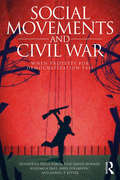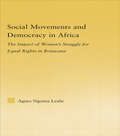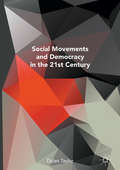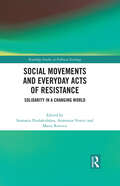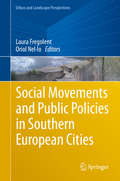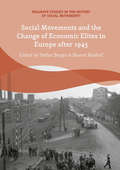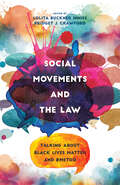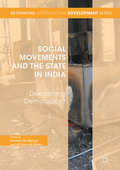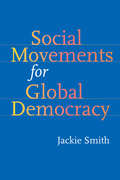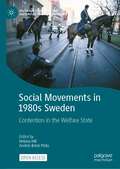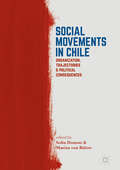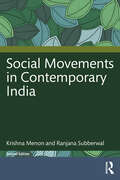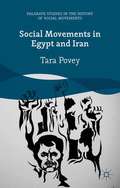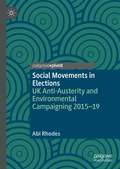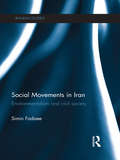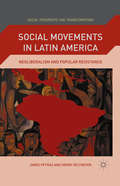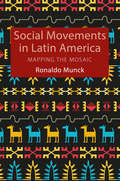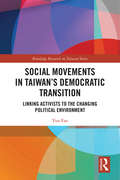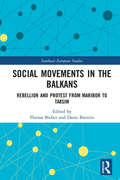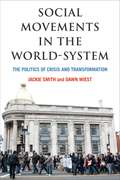- Table View
- List View
Social Movements and Civil War: When Protests for Democratization Fail (Routledge Studies in Civil Wars and Intra-State Conflict)
by Donatella della Porta Teije Hidde Donker Bogumila Hall Emin Poljarevic Daniel P. RitterThis book investigates the origins of civil wars which emerge from failed attempts at democratization. The main aim of this volume is to develop a theoretical explanation of the conditions under which and the mechanisms through which social movements’ struggles for democracy end up in civil war. While the empirical evidence suggests that this is not a rare phenomenon, the literatures on social movements, democratization and civil wars have grown apart from each other. At the theoretical level, Social Movements and Civil War bridges insights in the three fields, looking in particular at explanations of the radicalization of social movements, the failure of democratization processes and the onset of civil war. In doing this, it builds upon the relational approach developed in contentious politics with the aim of singling out robust causal mechanisms. At the empirical level, the research provides in-depth descriptions of four cases of trajectory from social movements for democratization into civil wars: in Syria, Libya, Yemen and the former Yugoslavia. Conditions such as the double weakness of civil society and the state, the presence of entrepreneurs of violence as well as normative and material resources for violence, ethnic and tribal divisions, domestic and international military interventions are considered as influencing the chains of actors’ choices rather than as structural determinants. This book will be of great interest to students of civil wars, political violence, social movements, democratization, and IR in general.
Social Movements and Democracy in Africa: The Impact of Women's Struggles for Equal Rights in Botswana (African Studies)
by Agnes Ngoma LeslieThis book examines social movements in Africa, analyzing how they emerge and how they may impact public policy, the legal and political situation, and the society by focusing on the following question: How do women's political and legal rights get extended and institutionalized in a patriarchal democratic society?
Social Movements and Democracy in the 21st Century
by Dylan TaylorThis book contends that the impasse of the Left today is in part, a result of an anarchist 'common sense' among activists. The author argues that the vital dynamics of anarchism and social movements need to be combined with a reappraisal of the Communist party and state. While cynicism towards capitalism and existing political institutions is plentiful, this book argues that the Left appears mired in a reactive politics of resistance, unable to formulate programmes for substantive social change. Drawing insights from the history of the Left, political economy, contemporary critical theory and an in-depth study of Occupy, the author provides concrete suggestions as to how the Left might 'claim the twenty-first century' and realise a more equitable social order. Social Movements and Democracy in the 21st Century challenges activists and scholars to rethink social movements and political organisation, and to actively work towards enduring social change. The book will be of interest to students and scholars of social movement studies, Left theory, critical theory, political sociology and Marxism, as well as anyone with an interest in 'political change'.
Social Movements and Everyday Acts of Resistance: Solidarity in a Changing World (Routledge Studies in Political Sociology)
by Stamatis Poulakidakos Anastasia Veneti Maria RoviscoThis book focuses on small-scale mobilisation and everyday social movements that take the form of grassroots resistance and solidarity initiatives. Through a series of case studies drawn from the UK, Europe, India, and Latin America, it examines the dynamics and role of micro-acts of resistance, with attention to a range of themes including organisational issues, the construction of collective identity, strategies, tactics and participation, and media representations and public perception of small-scale social movements. As such, it will appeal to scholars and students of sociology, media and communication and politics with interests in social movements, political mobilisation and activism.
Social Movements and Protest
by Gemma EdwardsThis lively textbook integrates theory and methodology into the study of social movements, and includes contemporary case studies to engage students and encourage them to apply theories critically. A wide range of protest cases are explored, from American, European and global arenas, including contemporary examples of political violence and terrorism, alter-globalisation, social networking and global activism. Key chapter features encourage students to engage critically with the material: method points uncover the methodology behind the theories, helping students to understand the larger study of social movements; debate points highlight classic arguments in social movement studies, encouraging students to critically assess theoretical approaches; and case studies connect theories to cases, allowing students to relate key principles to real-world examples. A companion website offers additional student and instructor resources, including lecture slides and worksheets.
Social Movements and Public Policies in Southern European Cities (Urban and Landscape Perspectives #21)
by Laura Fregolent Oriol Nel·loThe book analyzes the impact of urban movements on government and public policies in a context of rapid urban transformations, public policy crises and increasing social inequalities. The essays show how the impact of the movements is increasing and has effects both in the orientation of the policies, as in their form of management and its effects. The authors are leading scholars from universities and research centers in Spain, Italy, Portugal, France, Germany and the United Kingdom.
Social Movements and Referendums from Below: Direct Democracy in the Neoliberal Crisis
by Donatella Della Porta Francis O'ConnorOver recent years, social movements formed in response to European neoliberal austerity measures have played an increasingly important role in referendums. This is the first book to bridge the gap between social movement studies and research on direct democracy. It draws on social movement theory to understand the nature of popular mobilisation in referendums. Co-authored by one of the world's leading authorities on social movements, the book uses unique case studies such as the referendum on independence in Scotland, the consultations on independence in Catalonia, the Italian referendum on water, the referendum on the Troika proposals in Greece and the referendum on the debt repayment in Iceland, to illustrate the ways the social movements that formed as a consequence of the 2008 financial crash have affected the referendums' dynamic and results. It also addresses the way in which participation from below has had a transformative impact on the organisational strategies and framing practices used in the campaigns. Looking at general issues of democracy, as well as the political effects of neoliberalism, this topical book is ideally suited to understand the reasons for the Brexit result and will be read by a wide audience interested in social movements, referendums and democratic innovation.
Social Movements and the Change of Economic Elites in Europe after 1945 (Palgrave Studies in the History of Social Movements)
by Stefan Berger Marcel BoldorfThis book explores the changing nature of social movements and economic elites in post-Second World War Europe. In the years following 1945, Europe faced diverse challenges connected by the overriding question of how the reconstruction of the continent should proceed. For the Central Powers, the implementation lay in the hands of the Allied occupying forces who organised the process of denazification and the establishment of a new economic order. In countries without military occupation, there was a deep gap between the new governmental forces and the former collaborators. In both cases, social movements which were formed by anti-fascists on the left of the political spectrum assumed the task of social reorganisation. The chapters in this book explore the discourses about economic systems and their elites which moved to the fore across a range of European countries, uncovering who was involved, what resistance these social movements faced and how these ultimately failed in the West to bring about change, while in Eastern Europe Stalinism forcibly imposed change.
Social Movements and the Law: Talking about Black Lives Matter and #MeToo
by Lolita Buckner Inniss and Bridget J. CrawfordBlack Lives Matter and #MeToo are two of the most prominent twenty-first-century social movements in the United States. On the ground and on social media, more people have taken an active stance in support of either or both movements than almost any others in the country's history. Social Movements and the Law brings together the voices of twelve scholars and public intellectuals to explore how Black Lives Matter and #MeToo unfolded—separately and together—and how they enrich, inform, and complicate each other. Structured in dialogues and punctuated with informative text boxes, illustrations, and discussion questions, this accessible guide to an increasingly influential area of the law centers rich intersectional analysis of both movements and prompts readers to undertake further reflection and conversation. At a time of heightened public attention to the broader implications of human social behavior and interaction, this book shows rather than tells how people with different perspectives can engage one another with open minds and generosity of spirit.
Social Movements and the State in India
by Kenneth Bo Nielsen Alf Gunvald NilsenQuestions of the extent to which social movements are capable of deepening democracy in India lie at the heart of this book. In particular, the authors ask how such movements can enhance the political capacities of subaltern groups and thereby enable them to contest and challenge marginality, stigma, and exploitation. The work addresses these questions through detailed empirical analyses of contemporary fields of protest in Indian society - ranging from gender and caste to class and rights-based legislation. Drawing on the original research of a variety of emerging and established international scholars, the volume contributes to an engaged dialogue on the prospects for democratizing Indian democracy in a context where neoliberal reforms fuel a contradictory process of uneven development.
Social Movements for Global Democracy (Themes in Global Social Change)
by Jackie SmithHonorable Mention, 2010 Book Award, Global Division, Society for the Study of Social ProblemsHonorable Mention, 2010 PEWS Book Award, Political Economy of the World-System section of the American Sociological AssociationThis groundbreaking study sheds new light on the struggle to define the course of globalization. Synthesizing extensive research on transnational activism, Social Movements for Global Democracy shows how transnational networks of social movement activists—democratic globalizers—have worked to promote human rights and ecological sustainability over the predominant neoliberal system of economic integration.Using case studies of recent and ongoing campaigns for global justice, Jackie Smith provides valuable insight into whether and how these activists are succeeding. She argues that democratic globalizers could be more effective if they presented a united front organized around a global vision that places human rights and ecological stability foremost and if they were to directly engage governments and the United Nations.Illuminating the deep-seated struggles between two visions of globalization, Smith reveals a network of activists who have long been working to democratize the global political system.
Social Movements in 1980s Sweden: Contention in the Welfare State (Palgrave Studies in the History of Social Movements)
by Helena Hill Andrés Brink PintoThis open access book discusses the emergence and development, and in some cases also the disappearance, of social movements and activism in Sweden during the 1980s. Its aim is to nuance and problematize the image of the 1980s as unilaterally dominated by right-wing politics and neoliberalism, as well as the idea of a conflict-free Scandinavian model. The 1980s have often been described as a period when the influence of radical-left movements during the 1970s diminished. Instead, this book argues that the 1980s was a decade in which new radical social movements emerged in opposition to the prevalent political order, including the nuclear disarmament movement, the women's movement, anti-fascist movements, and the punk and environmental movements. The authors also demonstrate how issues such as squatting, nuclear resistance, rent strikes and the environment, included a variety of contentious collective action. Sweden, therefore, presents an interesting example of how resistance and conflict in a strong welfare state have been influenced by contentious social movements. Placing Sweden within the wider context of Scandinavia and Europe, this edited collection makes an important contribution to the history of social movements.
Social Movements in Britain (Theory and Practice in British Politics)
by Paul ByrneSocial Movements have become a central focus of political study in recent years. Paul Byrne's accessible account of British Social movements introduces students to the relevant theories, and puts them into practice by examining groups such as Greenpeace, Friends of the Earth, the Women's Movement and the Green Party. Byrne goes on to look at how the British scene compares with what is happening in the rest of Europe and in America.
Social Movements in Chile
by Sofia Donoso Marisa BülowThis book presents rich empirical analyses of the most important movements in Chile's post-transition era: the Student Movement, the Mapuche Movement, the Labor Movement, the Feminist Movement, and the Environmental Movement. The chapters illuminate the processes that led to their emergence, and detail how actors developed new strategies, or revisited old ones, to influence the political arena. The book also offers contributions that situate these cases both in terms of the general trends in protest in Chile, as well as in comparison to other countries in Latin America. Emphasizing various facets of the debate about the relationship between "institutional" and "non-institutional" politics, this volume not only contributes to the study of collective action in Chile, but also to the broader social movement literature.
Social Movements in Contemporary India
by Krishna Menon Ranjana SubberwalThis book delves into the concept and definition of social movements from different perspectives with relevance to India. It offers critical insight into the fundamental and ongoing debates and treatises around the struggle for rights and welfare.The book covers discussions on a wide range of movements varying in locus and spatial spread – from movements that highlight environmental issues to those that articulate the voices of women, Dalits, the queer community, persons with disabilities, and farmers. It explores the origins of people’s movements, what a collective is and how communities mobilize and organize. The authors also provide a history of the key social movements in India, examining the social, political, and cultural contexts in which they were born and continue being relevant in contemporary India.This revised and updated edition is an essential volume for students and researchers of social movement studies, sociology, political science and history, protest movements, sociological theory, the history of sociological thought, contemporary social theory, social policy, and international and globalization studies.
Social Movements in Egypt and Iran
by Tara PoveyThe contemporary movements seen on the streets of the Middle East today have their roots in a rich history of social and political struggle in the region. Since the 1990s, large-scale social movements have mobilised millions in opposition to authoritarian regimes often backed by the West. In Egypt, diverse movements opposed the Mubarak regime and its dependence on the US, and have gone on to fight for further transformative change. In Iran, an Islamic reform movement, women's movement and democracy movement has challenged the undemocratic and exclusivist nature of the Islamic state since the 1990s. This book analyses the reform movement in Iran and the groups and organisations that form the basis of the Egyptian opposition movement in their historical contexts. It argues that the contemporary movements have not arisen out of a vacuum but represent the culmination of over twenty years of mobilisation by social movements. This mobilisation is itself part of a history of struggle fordemocracy, social justice and freedom in the region that dates back over a century.
Social Movements in Elections: UK Anti-Austerity and Environmental Campaigning 2015-19
by Abi RhodesThis book focuses on the interrelatedness of social movements and elections and develops the theoretical dimension of movement-voter interaction. It posits that social movements engage in communicative tactics during elections to highlight specific issues and to convey ideas, values and beliefs to the voter. Applying methodological tools from political discourse analysis, the book considers the breadth of on- and offline tactics employed by the UK movement groups The People's Assembly Against Austerity and Extinction Rebellion in the 2015, 2017 and 2019 general elections. The book argues the case for social movement-voter interaction as a key aspect of social movement and political communication research.
Social Movements in Iran: Environmentalism and Civil Society (Iranian Studies)
by Simin FadaeeDespite the growing significance of social movements worldwide, scholarship on the subject remains largely Western in nature, with studies written primarily by Western scholars and based on the experiences of Western cultures and societies. This book makes an important contribution to the study of social movements in non-Western societies by examining their development in Iran. With a particular focus on the recent environmental movement, the author sheds new light on the implications and significance of these movements. Drawing on in-depth original research, the case study of the environmental movement is integrated into a historical and comparative analysis. Implementing the new social movement theory of Touraine and Melucci in the Iranian context, the author shows that although the reform movement of Iran is unique, in some aspects it is a continuation of the past social movements. She places emphasis on the role of women in recent Iranian social movements, exploring the significance of social movements in civil society and in instigating social change. Using the case of Iran to offer a critical framework for studying social change and transformation of non-European countries, this book fills an important gap in the existing literature on the topic. As such, it will be of great interest to scholars and students of sociology, political science and Middle Eastern studies.
Social Movements in Latin America
by Henry Veltmeyer James PetrasThe authors trace out the development of capitalism and U. S. imperialism in Latin America in the latest phase of this development, from the installation of the new world order of neoliberal globalization in the early 1980s to the present when U. S. imperialism is held at bay, neoliberalism is in decline, and capitalism is in crisis.
Social Movements in Latin America: Mapping the Mosaic
by Ronaldo MunckSocial movements are a key feature of the political and social landscape of Latin America. Ronaldo Munck explores their full range, emanating from different sections of Latin American society and motivated by many different concerns, including worker organizations, peasant and land reform movements, Indigenous groups, women's movements, and environmental groups. Although the mosaic of interlocking and connected issues and rights presents a complex map of social concerns and potentially a fragmented political force, these movements are likely to be at the centre of any future progressive politics in Latin America. As a result, they require careful understanding and a more nuanced theoretical approach. Drawing on insights from Latin American approaches to social movement theory, the book offers a distinctive contribution to social movement literature. The text incorporates detailed case studies and a methodological appendix for students wishing to develop their own research agendas in the field.
Social Movements in Malaysia: From Moral Communities to NGOs
by Meredith L. Weiss Saliha HassanThis book considers the proliferation in Malaysia over the past two decades of non-governmental organisations (NGOs) associated with various social movements, both to provide basic information about the NGOs and social movements, and to discuss their role in the development of civil society generally in particular their contribution to the reform movement, which has been gathering strength since 1998. The book discusses the nature and development of the movements, and shows that those movements concerned with human rights and women's issues have made significant contributions to the reform movement and been irrevocably changed by their involvement in it.
Social Movements in Taiwan’s Democratic Transition: Linking Activists to the Changing Political Environment (Routledge Research on Taiwan Series)
by Yun FanExamining the relationships between activists and the changing political environment, this book analyzes the trajectories of three major social movements in Taiwan during the country’s democratic transition between 1980 and 2000. In doing so, it explores why the labor and environmental movements became less partisan, while the women’s movement became more so. Providing a comparative discussion of these critical social movements, this book explores key theoretical questions and presents a rich and comprehensive analysis of social activism during this period of Taiwan’s political history. It focuses on causal mechanisms and variation and thus avoids the tautological trap of finding an "improving" political opportunity structure wherever a social movement is flourishing. Drawing on extensive data from over 140 activists’ demographic backgrounds, the discussion also builds upon existing studies of the "biographical" aspects of contention. This study then asks further questions about how certain tactics are chosen, not only how a repertoire of contention comes to have the shape it does. Combining both a theoretical and an empirical approach, this book will be useful to students and scholars of Taiwanese politics and society, as well as social movements and democracy more generally.
Social Movements in the Balkans: Rebellion and Protest from Maribor to Taksim (Southeast European Studies)
by Florian Bieber Dario BrentinFrom Slovenia to Turkey, social movements and protests have shaken the political systems of Southeast Europe. Confronting issues such as austerity, the provision and privatisation of welfare, public utilities and public space, corruption, bureaucratic inefficiency, environmental concerns and authoritarian tendencies, these revolts have also served as conduits for broader social and political discontent. While they have contributed to the defeat of unpopular policies and practices and the fall of governments, perhaps their most significant impact has been in creating dynamic political and social actors and contributing to the realignment of the political space. This volume sheds new light on the wave of protests and emerging social movements. Placing individual protests in a wider context, it highlights connections between different social movements and discusses parallels with similar movements from recent history. The contributors include both well-established scholars and up-and-coming researchers who engage with both activist and academic perspectives to identify the similar and varying dynamics of both the protests and the governments’ responses to them. Building upon studies of social movements, the book will be of interest to scholars examining political dissent, protests and mechanisms of mobilisation in the region.
Social Movements in the World-System: The Politics of Crisis and Transformation
by Jackie Smith Dawn Wiest American Sociological Association StaffGlobal crises such as rising economic inequality, volatile financial markets, and devastating climate change illustrate the defects of a global economic order controlled largely by transnational corporations, wealthy states, and other elites. As the impacts of such crises have intensified, they have generated a new wave of protests extending from the countries of the Middle East and North Africa throughout Europe, North America, and elsewhere. This new surge of resistance builds upon a long history of transnational activism as it extends and develops new tactics for pro-democracy movements acting simultaneously around the world. In Social Movements in the World-System, Jackie Smith and Dawn Wiest build upon theories of social movements, global institutions, and the political economy of the world-system to uncover how institutions define the opportunities and constraints on social movements, which in turn introduce ideas and models of action that help transform social activism as well as the system itself. Smith and Wiest trace modern social movements to the founding of the United Nations, as well as struggles for decolonization and the rise of national independence movements, showing how these movements have shifted the context in which states and other global actors compete and interact. The book shows how transnational activism since the end of the Cold War, including United Nations global conferences and more recently at World Trade Organization meetings, has shaped the ways groups organize. Global summits and UN conferences have traditionally provided focal points for activists working across borders on a diverse array of issues. By engaging in these international arenas, movements have altered discourses to emphasize norms of human rights and ecological sustainability over territorial sovereignty. Over time, however, activists have developed deeper and more expansive networks and new spaces for activism. This growing pool of transnational activists and organizations democratizes the process of organizing, enables activists to build on previous experiences and share knowledge, and facilitates local actions in support of global change agendas. As the world faces profound financial and ecological crises, and as the United States dominance in the world political economy is increasingly challenged, it is especially urgent that scholars, policy analysts, and citizens understand how institutions shape social behavior and the distribution of power. Social Movements in the World-System helps illuminate the contentious and complex interactions between social movements and global institutions and contributes to the search for paths towards a more equitable, sustainable, and democratic world. "
Social Movements that Care: Empathy, Solidarity, and Empowerment in the Fight Against Evictions
by Felipe G. SantosThe Platform of Those Affected by Mortgages (PAH) has left a crucial mark in the history of Spanish social movements by advocating for the over 700,000 families that have been evicted since its inception in 2009. This book explores how the PAH has blocked thousands of evictions through civil resistance, prevented many more through negotiations with banks, and rehoused thousands of evicted families in apartments recuperated from banks and vulture funds. Through the framework of the Politics of Care, Felipe G. Santos explores the emotional, identity, and participatory challenges that hindered the mobilization of those affected by mortgages. The book also reveals how empathy from a group of people unaffected by mortgage issues sparked mobilization, and how care relationships empowered those facing eviction to lead the fight for housing rights.
